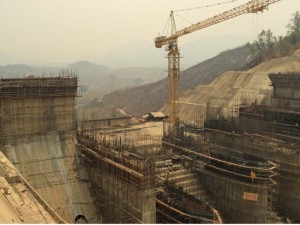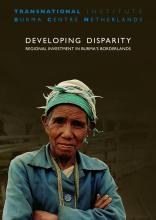Posts Tagged ‘Armed Conflict’ (233 found)
Burma’s Ethnic Areas Too Volatile for Foreign Investment
 In the same week that China announced that the Shwe oil and gas pipeline that runs across Burma will be completed in May, a report from the Transnational Institute and Burma Centre Netherlands, Developing Disparity: Regional Investment in Burma’s Borderlands, warns that foreign investment in ethnic areas has the potential to exacerbate ethnic tensions and disempower local communities.
In the same week that China announced that the Shwe oil and gas pipeline that runs across Burma will be completed in May, a report from the Transnational Institute and Burma Centre Netherlands, Developing Disparity: Regional Investment in Burma’s Borderlands, warns that foreign investment in ethnic areas has the potential to exacerbate ethnic tensions and disempower local communities.
The completion of the 700-mile Shwe dual oil and gas pipeline will conclude the opening chapter of a project that has created a platform for a plethora of human rights abuses. Transporting oil and gas from the Bay of Bengal, the pipeline starts in Arakan State, and passes through Magway and Mandalay Divisions and Shan State, before finishing in Yunnan province, China. While the military controlled company, the Myanmar Oil and Gas Enterprise will gain up to $29 billion over the next 30 years through sale of oil and gas to China, the project has already negatively affected communities across Burma, as the Ta’ang Students and Youth Organization recently documented in Ta’ang areas of Shan State […]
Visit to Kachin IDP camps: 7 to 24 February 2013
Since the beginning of fighting in Kachin State on June 9th 2011, the Kachin Relief Fund (KRF) has been providing aid direct to IDPs with local actors. The KRF is fulfilling the major gaps using supporters’ donations, while international agencies have been preoccupied with their inability to operate freely in the KIO administrative areas.
The KRF has identified many needy spaces not been covered by the UN relief agencies or the DFID’s funded projects […]
• • •Myanmar: “Reforms Continue Apace, But Key Human Rights Issues Remain Unaddressed” – UN Expert
The United Nations Special Rapporteur on the human rights situation in Myanmar, Tomás Ojea Quintana, commended the progress achieved so far by the reform process in Myanmar, but called on the Government to urgently address a number of human rights issues […]
• • •Developing Disparity: Regional Investment in Burma’s Borderlands
 Unless foreign direct investment in Burma’s war-torn borderlands is refocused towards people-centered development, it is likely to deepen disparity between the region’s most neglected peoples and Burma’s new military, business and political elite and exacerbate a decades-long civil war.
Unless foreign direct investment in Burma’s war-torn borderlands is refocused towards people-centered development, it is likely to deepen disparity between the region’s most neglected peoples and Burma’s new military, business and political elite and exacerbate a decades-long civil war.
Burma has entered a pivotal stage in its political and economic development. The advent of a new quasi-civilian government has raised the prospect of fundamental reforms […]
Human Rights Situation Deteriorated as Fighting Intensified in Kachin State
Burma’s human rights situation in January 2013 remained poor, in large part, due to the intensified fighting in Kachin State. In January 2013, the Burmese military admitted that it had launched an aerial assault against the strongholds of the KIO/KIA.
According to a member organization of the ND-Burma, there are over 25,000 refugees being sheltered in close proximity to the aerial attacks. Reports of civilian causalities have also been received […]
• • •UN Special Rapporteur Visit to Assess Human Rights Situation
The United Nations Special Rapporteur on the human rights situation in Myanmar, Tomás Ojea Quintana, will undertake an official visit to the country from 11 to 16 February 2013, which will include gathering information on the current situation in Kachin State and Rakhine State. The rights expert visits the country at the invitation of the Government […]
• • •Statement from the Women’s Workshop on Peace-Building and Conflict Transformation
Forty-six women representatives from 31 ethnic women’s organizations from various regions and states of Myanmar held a workshop on peace-building and conflict transformation in Yangon during January 30 – February 1, 2013.
Participating representatives issued the following position statement on the final day of the workshop […]
• • •CSW and CHRO Welcome MEP’s Letter to EU Foreign Policy Chief on Human Rights Violations in Burma
Christian Solidarity Worldwide (CSW) and the Chin Human Rights Organization (CHRO) today warmly welcomed a letter sent by Members of the European Parliament (MEPs) to the High Representative of the Union for Foreign Affairs and Security Policy, Baroness Catherine Ashton, highlighting ongoing human rights violations in Burma […]
• • •Karen in Europe Calls on the EU to Take Stronger Actions on the Attacks in Kachin State
Karen communities in Europe condemn the Burmese Army’s continuous attack against the Kachin people and calls on the Thein Sein government to stop making empty promises of ceasefire, and commit to a genuine nationwide ceasefire and genuine dialogue leading to a political solution in Burma […]
• • •Deciphering Myanmar’s Peace Process: A Reference Guide
The new nominally civilian government is making serious efforts to achieve peace in Myanmar after more than 60 years of civil war. Peace is critical for ending human suffering and achieving stability; a precondition for overcoming poverty, ensuring long term development and protecting
• • •








 All posts
All posts